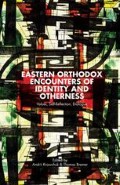Abstract
In their attitudes toward the West, Serbia and Greece represent two very different cases. Greece has long been a member of Western structures such as NATO and can therefore be regarded as a member or partner of the West. In contrast, Serbia’s relationship with the West is more complicated because of historical circumstances in the twentieth century, in particular the wars in the 1990s in Croatia, in Bosnia-Herzegovina, and in Kosovo, the latter including the NATO bombings of Serbia. Whereas Greece has been a member of the European Union since 1981, Serbia has only recently taken its first steps toward such membership.
Access this chapter
Tax calculation will be finalised at checkout
Purchases are for personal use only
Preview
Unable to display preview. Download preview PDF.
Notes
Lina Molokotos-Liederman, “Sacred Words, Profane Music? The Free Monks as a Musical Phenomenon in Contemporary Greek Orthodoxy,” sociology of Religion 65:4 (2004), 411–412.
Alfons Brüning, “Spannungsverhältnis. ‘Orthodoxe Werte’ und Menschenrechte,” Osteuropa 59:6 (2009), 66.
Elizabeth Prodromou, “The Ambivalent Orthodox,” Journal of Democracy 15:2 (2004), 70.
Georgios Metallinos, “Orthodox and European Culture. The Struggle between Hellenism and Frankism,” http://www.romanity.org/mir/me04en.htm, 1995 (accessed December 17, 2010).
In 2000, the Greek government decided to remove any reference to religious affiliation from identity cards, in order to avoid discrimination against non-Orthodox Greeks. This provoked a conflict with the Greek Orthodox Church, which regarded this measure as an attack on the link between Hellenism and Orthodoxy. More about the identity card conflict in Greece can be found in: Vasilios N. Makrides, “Between Normality and Tension: Assessing Church-State Relations, in Greece in the Light of the Identity (Cards) Crisis,” in Vasilios N. Makrides (ed.), Religion, Staat und Konfliktkonstellationen im orthodoxen Ostund Südosteuropa. Vergleichende Perspektiven (Frankfurt am Main: Peter Lang, 2005), pp. 137–178.
More about Greek rigorists can be found in Vasilios N. Makrides, “L’autre’ orthodoxie: courants du rigorisme orthodoxe grec,” Social compass 51:4 (2004), 511–521.
Ivan ČoIović, “Europa als Gegenstand der zeitgenössischen politischen Mythologie in Serbien,” in Harald Heppner and Grigorios Larentzakis (eds.), Das Europa-Uerständnis im orthodoxen Südosteuropa, Institut fir Ökumenische Theologie und Patrologie (Graz, 1996), pp. 194–195.
Atanasije Jevtić, “The Cry of Serbs from Kosovo and Metohija,” http://www.mitropolija.co.me/duhovnost/vatanasije-cry.htm, 1999 (accessed January 26, 2010).
Anna Di Lellio, “The Missing Democratic Revolution and Serbia’s Anti-European Choice: 1989–2008,” International Journal of Politics, Culture, and Society 22 (2009), 382. The following is an example of the Free Monks’ lyrics: “Hold on tight to the faith, hold on to the great ideals / We won’t sell the fatherland off / The church will not die / History won’t be forgotten / This atheist civilization signs treaties and agreements / You’re not a person anymore, just a bar code number.” http://www.youtube.com/watch?v=mGTePB-dups (accessed February 24, 2012).
Dijana Gaćeša, “Fundamentalist Tendencies of Serbian Orthodox Christianity,” Western Balkans Security Observer 7–8 (2007–2008), 77–78. See also the Poem to St. Sava: “Sweet Lord speaks when he walks the earth / Of spiritual drink and of living water: / Blessed is the one who drinks it in this age, / Living rivers will flow from him. / No one in the Serbian nation could / Drink in living water like you. / Hence the rivers gushed out of you / And watered wonderfully all the Serbian land: / Grace and justice and holy truth, / Hope and brotherhood and upright education, / Strong patriotism, gentle brotherly love / These are your waters, each deeper in turn. / You watered living seedbeds with them / You watered them till now, you’ll water them from now on. / Just like Egypt is waterless without the Nile / So is your homeland without you.” http://www.mitropolija.co.me/ustrojstvo/radio/vladika/vladika/index_eng.html(accessed February 24, 2012).
Vasilios N. Makrides, “Neoorthodoxie—eine religiöse Intellektuellenströmung im heutigen Griechenland,” in Peter Antes and Donate Pahnke (eds.), Die Religion von Oberschichten. Religion—Profession—Intellektualismus (Marburg: Diagonal, 1989), p. 286.
Christos Yannaras, “La Théologie en Grèce aujourd’hui,” Istina 16 (1971), 131–150.
Artemije Radosavljević, Zivot svetog vladike Nikolaja Velimirovića—Novi Zlatoust, Parish of Lelie and Celije Monastery, 1991, cited in Helsinki Committee for Human Rights in Serbia, “The Serbian Orthodox Church and the New Serbian Identity,” http://www.helsinki.org.rs/doc/Studija-Kupres-eng.pdf, 2006 (accessed Februarγ 4, 2011), pp. 10–11.
Klaus Buchenau, “Svetosavlje und Pravoslavlje. Nationales und Universales in der serbischen Orthodoxie,” in Martin Schulze Wessel (ed.), Nationalisierung der Religion und Sakralisierung der Nation im östlichen Europa (Stuttgart: Franz Steiner, 2006), p. 206.
Maria Falina, “Svetosavlje. A Case Study in the Nationalization of Religion,” Schweizerische Zeitschrift für Religions- und Kulturgeschichte 101 (2007), 520.
Nikolaj Velimirović, Srpski narod kao Teodul(Beograd: Evro, 2003), p. 225.
Bojan Aleksov, “Nationalism in Construction: The Memorial Church of St. Sava on Vračar Hill in Belgrade,” Balkanologie 7:2 (2003), 51.
Christos Yannaras, Person und Eros. Eine Gegenüberstellung der Ontologie der griechischen Kirchenväter und der Existenzphilosophie des Westens (Göttingen: Vandenhoeck & Ruprecht, 1982), p. 99.
Christos Yannaras, The Freedom of Morality (Crestwood, New York: St. Vladimir’s Seminary Press, 1984), p. 220.
Justin Popović, Orthodox Faith and Life in Christ (Belmont, MA: Institute for Byzantine and Modern Greek Studies, 2005), p. 100.
Justin Popović, L’homme et le dieu-homme (Lausanne: L’age d’homme, 1989), p. 45.
Christos Yannaras, “Orthodoxy and the West,” Philotheos 2 (2002), 79–80.
R. Chrysostomus Grill, Serbischer Messianismus und Europa bei Bischof Velimirovic (St. Ottilien: EOS, 1998), pp. 155–157.
Nikolaj Velimirović, Serbia in Light and Darkness (London: Longmans, Green and Co., 1916).
Nikolaj Velimirović, Kroz tamnicki prozor (Beograd: Evro, 2007), p. 138.
Editor information
Copyright information
© 2014 Andrii Krawchuk and Thomas Bremer
About this chapter
Cite this chapter
Lis, J.A. (2014). Anti-Western Theology in Greece and Serbia Today. In: Krawchuk, A., Bremer, T. (eds) Eastern Orthodox Encounters of Identity and Otherness. Palgrave Macmillan, New York. https://doi.org/10.1057/9781137377388_11
Download citation
DOI: https://doi.org/10.1057/9781137377388_11
Publisher Name: Palgrave Macmillan, New York
Print ISBN: 978-1-349-48018-0
Online ISBN: 978-1-137-37738-8
eBook Packages: Palgrave Religion & Philosophy CollectionPhilosophy and Religion (R0)

